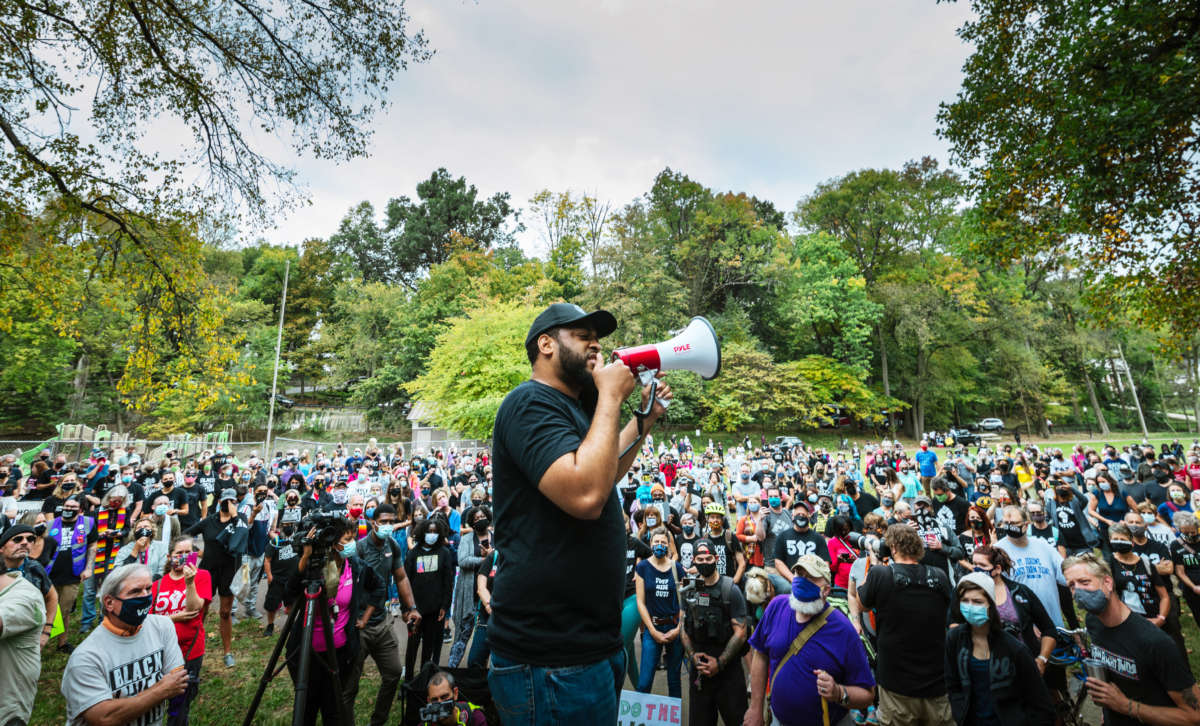Charles Booker, a former Kentucky state representative from Louisville and an outspoken advocate for progressive policy and Black lives, announced on social media Monday that he is “strongly” considering a 2022 challenge to Republican Sen. Rand Paul.
Hailing from Louisville’s west end, where violent policing in historically Black neighborhoods is well documented, Booker gained national attention speaking to demonstrators and the media as his hometown became an epicenter for Black Lives Matter protests following the police-perpetrated killing of Breonna Taylor last spring.
Running on support for policies such as universal basic income and Medicare for All that he says are necessary for addressing economic inequality and structural racism, Booker narrowly lost a closely watched primary race last year against Amy McGrath, a moderate who unsuccessfully challenged Senate Majority Leader Mitch McConnell.
Booker received high-profile endorsements from progressives such as Sen. Bernie Sanders and Sen. Elizabeth Warren, and the primary race against McGrath was watched closely as a bellwether for progressive challengers as Black Lives Matter and other social movements nudge the Democratic Party to the left. Now Booker is eyeing a challenge to Paul, a popular Republican, as part of an anti-racist “new southern strategy” for building Democratic voter power in the South.
“We’re going to end poverty,” Booker said in an interview Sunday with Kentucky Educational Television (KET). “We are going to make sure people across Kentucky have health care…. We are going to make sure everyone has a living wage, because we are going to stand up for organized labor.”
Booker recently launched Hood to the Holler, a voter mobilization nonprofit “breaking down barriers of race and class” to build political power across Kentucky that has already organized about 11,000 volunteers across the state. Booker hopes to bridge the urban-rural voter divided with proposals like the Green New Deal — he calls it the Kentucky New Deal — which would address climate change while creating new jobs in Appalachian communities devastated by the declining coal industry.
“It’s realizing that people are the most important aspect of democracy, it’s realizing that the voices of people in the forgotten places — the hood where I am from and the hollers in Appalachia and everywhere in between — that those voices are the pathway to a brighter future,” said Booker, who added that the group has organized 11,000 volunteers across Kentucky.
Booker is taking cues from Georgia Democrat Stacey Abrams and other activists who have launched successful movements to combat voter suppression and drive turnout across the South. Having campaigned in Appalachian Kentucky for his 2020 Senate bid, Booker also encourages progressives to “show up and listen” to voters in conservative, rural districts.
“I am humbled to even be mentioned with the likes of Stacy Abrams… Kentucky is not Georgia, but what Georgia helped us see is that change is possible, anywhere,” Booker told KET.
There has also been speculation that Booker would run for mayor of Louisville, where he is already well known among voters who mobilized amid Black Lives Matter protests to put Booker within striking distance of McGrath. Some have wondered whether the 37-year-old former state lawmaker, who grew up poor in Louisville, can build a solid coalition across a state where conservative white Democrats may be wary about voting for a Black politician with an activist reputation.
If Charles Booker runs for Senate I would support him, but lets keep it a buck.Kentucky is not Georgia.The demographics are entirely different.What worked here will not work everywhere.He could get real change accomplished as Mayor of Louisville. The demographics line up as well.
— Alan Holmes (@oh_HOLMES) March 15, 2021
In Georgia, Democrats and voting rights activists focused closely on boosting Black voter turnout, which helped turn the state blue in 2020 and elect two Democrats to the Senate in a historic election that rattled the white, conservative power structure across the South. However, Georgia is about 32 percent Black, while Blacks only make up about 9 percent of the population in Kentucky, according to Census data.
However, Booker knows he cannot win against Paul without white voters. He hopes Hood to the Holler will unite urban and rural voters around common issues and a “populist” message, arguing that Appalachian communities in the “holler” often face the same problems as people of color in the “hood,” including barriers to health care, job losses and violent policing. Drawing from his experience growing up in a low-income neighborhood and campaigning among miners in Eastern Kentucky, for example, Booker argues voters will unite around progressive issues if they are willing to listen to each other and realize their common interests.
“We’ve just allowed national politics to dictate the narrative. People like Mitch McConnell have told us that we are divided, but we aren’t,” Booker said on Sunday. “We’re unified in our fight to heal, to take care of family, to take care of Kentucky, and that is a message that can build new coalitions, and I am excited to tell that story.”
Booker cautioned on Sunday that he has not yet made a final decision about running for Senate or a different office and continues to study his prospects, but an announcement would be coming soon.
Join us in defending the truth before it’s too late
The future of independent journalism is uncertain, and the consequences of losing it are too grave to ignore. To ensure Truthout remains safe, strong, and free, we need to raise $33,000 in the next 2 days. Every dollar raised goes directly toward the costs of producing news you can trust.
Please give what you can — because by supporting us with a tax-deductible donation, you’re not just preserving a source of news, you’re helping to safeguard what’s left of our democracy.
